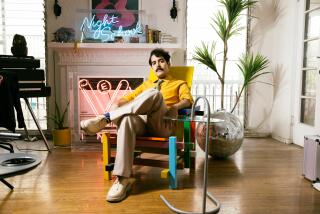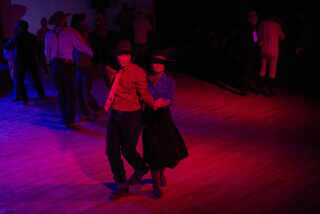POP MUSIC REVIEW : Fiddler Kershaw Bustles With Fun-Loving Cajun Spirit
- Share via
Doug Kershaw was one of the first Cajun musicians to make an impression in the world beyond the Louisiana bayous and prairies.
But in a fiery performance Monday night at the Crazy Horse Steak House in Santa Ana, the wild-eyed fiddler from Tiel Ridge, La., was less inclined to draw upon Cajun musical traditions than he was to cast himself as a Bunyanesque personification of the high-spirited, fun-loving side of the Cajun personality.
For the authentic sound of Louisiana, the fiddlers to hear are players like Dewey Balfa and Michael Doucet, widely traveled and acclaimed folk musicians whose performances bring out the raucous energy of Cajun celebrations in a more earthy, less theatrical way than Kershaw did at the Crazy Horse.
Without sacrificing intensity or falling into moroseness, Balfa and Doucet also manage to evoke the melancholy undercurrent of Cajun life (Cajun culture began in defeat, when the French-speaking Acadians of eastern Canada were uprooted by the British more than 200 years ago and went to poor, rural Louisiana). That sense of sadness and hardship underlying--but never dampening--an exuberant way of living is what gives traditional Cajun music its emotional complexity and a lot of its appeal.
If Kershaw isn’t the right Cajun for capturing cultural essences, he’s not a bad Cajun to spend an hour with if you’re looking for a lively good time and a singular brand of showmanship. It’s worth remembering that while traditionalists Balfa and Doucet (who is noted for expanding on traditional Cajun music and taking it in new directions) have always been based in Louisiana, Kershaw left the bayous for Nashville more than 30 years ago while he was still in his teens. He didn’t make his name by playing pure Cajun music, but by bringing a uniquely boisterous Cajun personality to country music.
That personality, and the uncommonly high energy level that went with it, never flagged during Kershaw’s early show. He came out decked in Hollywood-cowboy style, in a fancy black shirt with white fringes and embroidery. The fringes on the shirt hardly stopped flapping, because Kershaw hardly stopped moving.
His wiry frame was perpetually bobbing and weaving, and Kershaw made enough broad sweeps and flourishes with his fiddle bow to earn a tryout for the Olympic fencing team. His capering didn’t stop when he switched to accordion for “Cajun Stripper Queen,” a zesty, lighthearted tune that had the crowd clapping happily along. Kershaw’s face was as mobile as his limbs and hips, alternately wearing a big grin, a bug-eyed look of surprise, or a humorous grimace. Naturally, Kershaw avidly punctuated his gruff singing with Cajun whoops and yells.
It is off-putting when such theatrics appear calculated. Kershaw’s performance was thoroughly theatrical, but it never appeared less than sincere. The gyrating, the hollering--all of it came off as nothing less than an honest and natural expression of his pleasure in performing.
Kershaw’s show lasted only an hour, and that included a 10-minute warm-up by his sharp, four-man backup band. But his eight songs offered enough intensity and variety to make the concert seem like a full accounting of Kershaw’s talent.
Kershaw combined hard-sawing fiddling and animated singing on tunes like “Diggy Liggy Lo” and his new single, the Hank Williams song “Cajun Baby” (the record is a duet with Hank Williams Jr.).
But he also came up with some memorable moments in less frenzied settings. Toward the end of the lilting “Louisiana Saturday Night,” Kershaw showed that, in addition to the blazing, wailing runs, he could make his fiddle sound stately and sweet.
On “Natural Man,” Kershaw switched to acoustic guitar and, with the help of Max Schwennsen and Danny O’Neil on electric guitars, wove a rich and precise tapestry in a number that was alternately dramatic and funny. By the end of the song, a celebration of the independent rural life, Kershaw was scatting and whooping and singing with so much unfettered and unpremeditated emotion that he sounded like a Cajun Van Morrison.
Between songs, Kershaw was a puckish host. At one point, he referred to himself by a slightly ribald, self-mocking nickname that Cajuns have for themselves, adding for the benefit of a bemused audience that “You should hear what we call you.”
Most of his comments, and the themes of most of his songs, looked back toward his Cajun origins. While Kershaw may not be the musician to turn to for an authentic musical rendering of those origins, his show was a sterling example of the liveliness and freedom from inhibition that are a big part of the Cajun way.
More to Read
The biggest entertainment stories
Get our big stories about Hollywood, film, television, music, arts, culture and more right in your inbox as soon as they publish.
You may occasionally receive promotional content from the Los Angeles Times.











